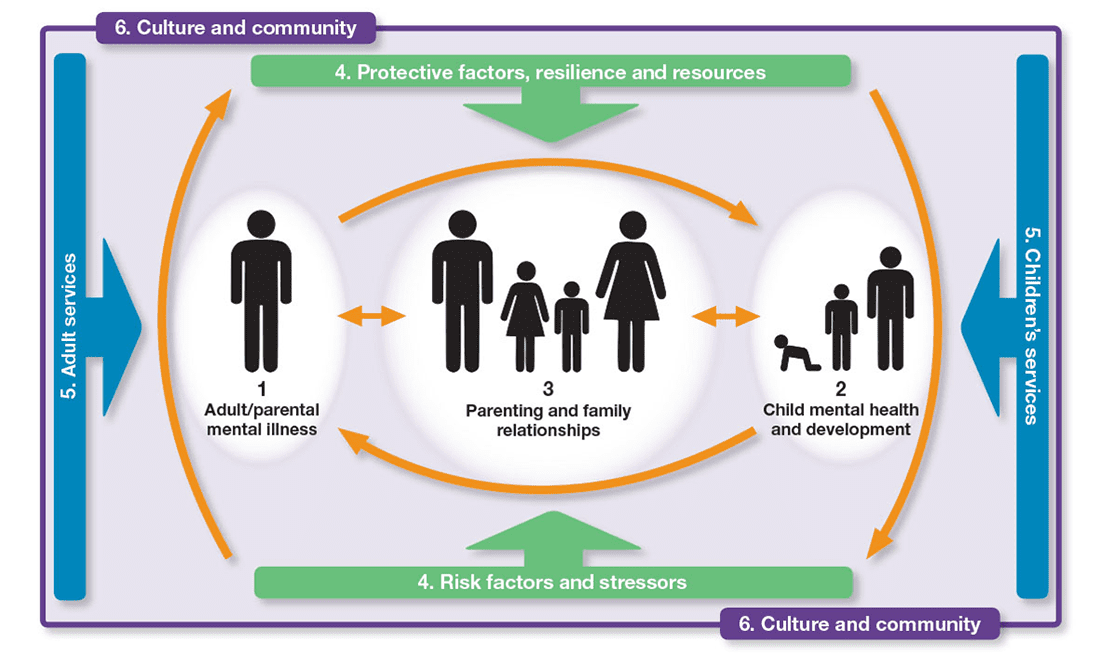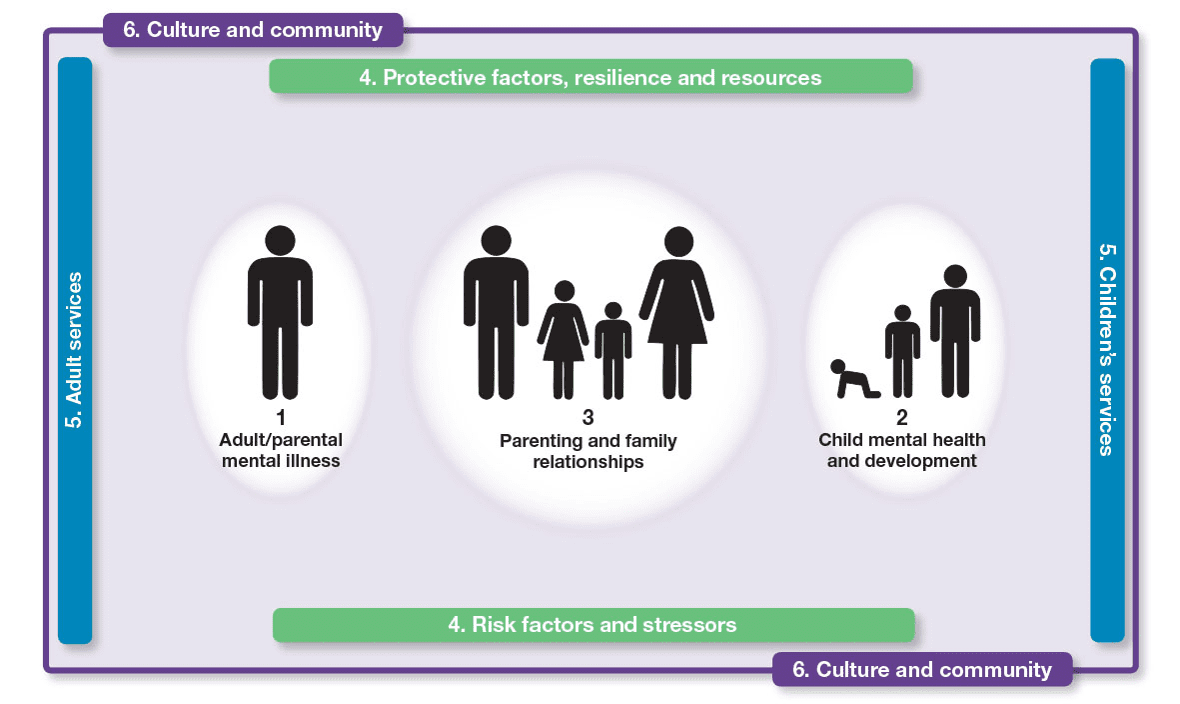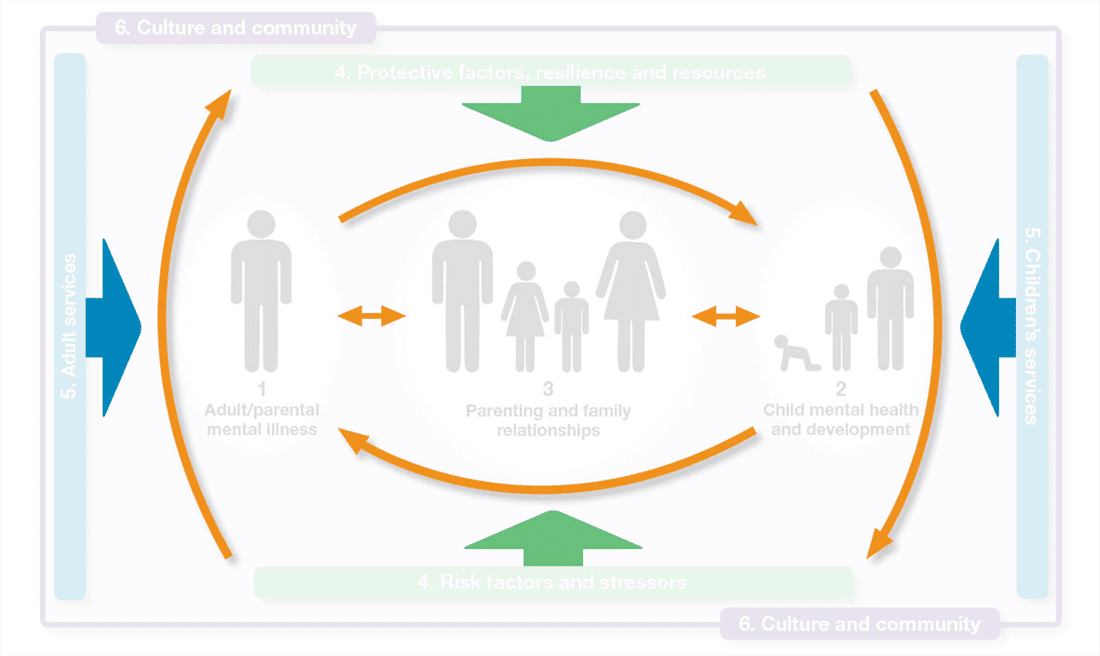What does TFM consist of?
Six Principles
Six Principles inform The Family Model and provide the foundation for a lifespan and transgenerational approach to family recovery from mental health challenges. The mental health and well-being of children and adults within families in which an adult carer is mentally ill are intimately linked in at least six ways, as illustrated in the diagram below.



1
Individual adult experiences
Adult/parental mental illness can adversely affect the development, mental health and, in some cases, the safety of children (an adult/parent-to-child influence).
2
Individual child/young person experiences
Children, particularly those with emotional, behavioural or chronic physical difficulties, can precipitate or exacerbate mental ill-health in their parents/carers (a child-to-parent influence).
3
Linking adult/parent and child/young person experiences (family relationships)
Growing up with a mentally ill parent may have an adverse influence on the quality of that person’s adjustment in childhood and/or adulthood, including their transition to parenthood (a childhood-to-adulthood family lifespan influence).
4
Strengths and struggles
Adverse circumstances (such as poverty, lone parenthood, social isolation or stigma and genetic liability) can negatively influence both adult/parent and child mental health (an environment-to-family influence), but resilience means that negative outcomes are not inevitable.
4
Strengths and struggles
Adverse circumstances (such as poverty, lone parenthood, social isolation or stigma and genetic liability) can negatively influence both adult/parent and child mental health (an environment-to-family influence), but resilience means that negative outcomes are not inevitable.
5
Adult and child/youth services
The quality of contact/engagement between individuals, families, practitioners and services is a powerful determinant of outcome for all family members (a service-to-family influence).
5
Adult and child/youth services
The quality of contact/engagement between individuals, families, practitioners and services is a powerful determinant of outcome for all family members (a service-to-family influence).
6
An ecological frame
The above five principles and their interactive relationships all occur within a broader social network encompassing cultural and community influences (a broader, more distal, environment-to-family influence).
6
An ecological frame
The above five principles and their interactive relationships all occur within a broader social network encompassing cultural and community influences (a broader, more distal, environment-to-family influence).
Each principle links to a corresponding domain and in doing so highlights the key areas and inter-connections between mental illness, parenting and children. Collectively the principles also demonstrate the links over time (lifespan) and across generations between individuals, relationships and mental ill health.
Six Domains
Each Domain represents a key area of focus when considering the mental health needs of individuals within their family context. How these core components interact with and influence each other determines the quality of an individual’s adjustment within his or her family, as well as the adequacy of the whole family’s adaptation to living with a family mentally experiencing mental ill-health.


Ten Arrows
The Family Model is explicit in its emphasis on the importance of links (relationships) between domains, represented by arrows. These links and their interactive influences occur at a particular point in time and over time. Each component affects & is affected by every other component (the arrows are bi-and multi-directional).


Six Messages
There are six key messages which emerge from The Family Model approach, one derived from each of the domains and corresponding arrows:



1
Helping parents help children helps parents
Adult/parental mental ill-health can affect the development and in some cases the safety of children.
Early identification of parents experiencing mental ill-health and mentally ill adults who are parents/carers is essential for early intervention and prevention measures to reduce risks and promote family mental health.
2
Helping children helps parents help children
Children, particularly those with emotional, behavioural or chronic physical difficulties, can precipitate or exacerbate mental ill-health in their parents/carers.
Early identification and intervention can reduce the proportion of children & young people whose experience of early adversity (including their own and their parents’ mental ill-health) makes them susceptible to later difficulties, including mental ill-health, in their transition to adulthood and parenthood.
3
Good relationships protect
Mental illness can affect parenting and the parent-child relationship and parenthood can precipitate and influence mental illness.
The links between mental health & parenting thus begin very early in life, are evident across the lifespan and are an important determinant of health and social outcomes in succeeding generations.
4
Nature via nurture
Whilst adverse circumstances (such as poverty, lone parenthood, social isolation, and stigma) can negatively influence both child & parental mental health, poor outcomes are not inevitable, effective treatments are available and prevention is possible.
The risks associated with genetic liability for mental illness must be incorporated into the increasing evidence base of effective psychosocial interventions which support recovery, resilience and family mental health.
4
Nature via nurture
Whilst adverse circumstances (such as poverty, lone parenthood, social isolation, and stigma) can negatively influence both child & parental mental health, poor outcomes are not inevitable, effective treatments are available and prevention is possible.
The risks associated with genetic liability for mental illness must be incorporated into the increasing evidence base of effective psychosocial interventions which support recovery, resilience and family mental health.
5
Working better together
The quality of contact / engagement between individuals, families, practitioners and services is a powerful determinant of outcome for all family members.
When parents experience mental ill-health, they and their children are better supported and protected if agencies and practitioners co-ordinate services and support. Intervening earlier facilitates recovery and has longer-term, preventive benefits.
5
Working better together
The quality of contact / engagement between individuals, families, practitioners and services is a powerful determinant of outcome for all family members.
When parents experience mental ill-health, they and their children are better supported and protected if agencies and practitioners co-ordinate services and support. Intervening earlier facilitates recovery and has longer-term, preventive benefits.
6
Mental health is everyone’s responsibility
Cultural, community & neighbourhood factors underpin and interact with parental mental ill-health, child development & mental health, parenting and the parent-child relationship, and service contacts in a multi-directional, ubiquitous manner.
The quality of social support for individuals experiencing mental illness and their families is an important determinant of the level and type of service need and hence recovery. Tackling stigma is everyone’s responsibility.
6
Mental health is everyone’s responsibility
Cultural, community & neighbourhood factors underpin and interact with parental mental ill-health, child development & mental health, parenting and the parent-child relationship, and service contacts in a multi-directional, ubiquitous manner.
The quality of social support for individuals experiencing mental illness and their families is an important determinant of the level and type of service need and hence recovery. Tackling stigma is everyone’s responsibility.
